ADHD and Sleep Issues: How Closely Are They Related?
written by / April 17, 2020
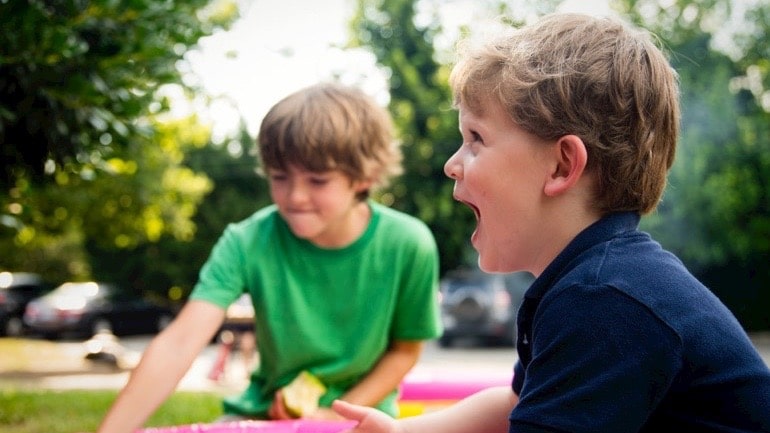
As attention deficit hyperactivity disorder (ADHD) becomes more prevalent than was first believed, it becomes essential to know the symptoms. Hyperactive children classified as bad, naughty, lazy, or even violent usually remain undiagnosed for a long time. ADHD and sleep issues may not only be related, but one might mask the symptoms of the other, making it unclear if the child should be brought to a specialist.
The previous, outdated name, attention deficit disorder (ADD)—with symptoms such as disorganization, lack of focus, and forgetfulness—has been replaced by the official term ADHD. Today, there’s no difference between ADHD vs. ADD; there’s only ADHD. However, sleep problems are also common in children with other developmental disorders, such as autism.
Is ADHD a Disability?
Even Hippocrates identified ADHD as a condition. He described patients who had accelerated responses to sensory perceptions but with little consistency, as their emotions would quickly transition into another state. However, Hippocrates attributed this to “the supremacy of fire over water.”
Today, ADHD is defined as a neurodevelopmental disease that affects about 5% of people, both children and adults. The affected children experiencе inattention, hyperactivity, forgetfulness, poor impulse control, or impulsivity. Furthermore, ADHD and sleep problems often go together.
Children with ADHD seem to not listen, make trouble more often, have difficulty keeping their attention on single tasks, struggle following instructions, avoid mental effort for an extended period, lose things, and become easily distracted, which can lead to forgetfulness.
Official data show that ADHD can affect 3%–4% of children in early school age, but sometimes the symptoms appear much earlier. When we’re talking about ADHD, insomnia could be a single symptom. Usually, among the first symptoms are pronounced impulsiveness, hyperactivity, and an inability to concentrate or show control.
The condition is more common in boys than in girls. Since boys usually exert more wild behavior, this is the reason the diagnosis is sometimes delayed. With ADHD, trouble sleeping can also include inadequate and unregulated sleep, irritability and excessive impulsivity, hypersensitivity to stimuli, and intolerance to noise, light, and temperature changes.
It’s assumed that ADHD in children has a familial etiology and neurological mechanisms. These are associated with a developmental delay in the frontal and temporal lobes of the brain, as well as the accelerated development of the motor cortex. This entirely coincides with the main symptoms of ADHD, hyperactivity and attention deficiency, and can probably explain why those with ADHD also have insomnia.
Can Lack of Sleep Cause ADHD Symptoms?
Usually, parents start to see the first symptoms of ADHD when their children reach school. These symptoms aren’t the result of low intelligence in the children, but rather of their inability to work and keep their concentration. Secondary symptoms include struggles with memorization due to a lack of attention, trouble regulating emotions, and poor self-control. These can lead to problems with communication and understanding, as well as complicated relationships with family and peers.
ADHD and sleep disorders are another category of symptoms. Last but not least, children with ADHD experience a lack of confidence and a constant feeling of failure.
ADHD is a chronic disease, and between 10% and 60% of affected children continue to exhibit symptoms as adults. ADHD symptoms in adults, however, can be mild. Interestingly, the prolonged course of ADHD and sleep problems in adults can continue.
Proper, timely diagnosis and effective treatment will allow your child to be happy and develop their potential at school and in life. Conversely, undiagnosed and untreated conditions may lead to lower adaptability to different social environments, as well as dysfunctional relationships, less success in school, and risky behavior.
Sleep disorders and ADHD are linked in both children and adults. In recent years, many parents have reported that their children with ADHD also suffer sleep problems, but few studies have examined the possible link between them. Most of these sleep disorders include insomnia, sleep deprivation, bruxism, restless legs syndrome, obstructive sleep apnea, somnambulism, circadian rhythm disorders, etc. As a note on ADHD and sleep patterns, children are more likely to experience night terrors than adults.
It was demonstrated that there’s also a behavioral component. As such, there may be mental symptoms, such as anxiety or depression, that can disturb sleep. Sometimes, there are no real problems with sleep other than a refusal to sleep.
Sleep Problems and ADHD
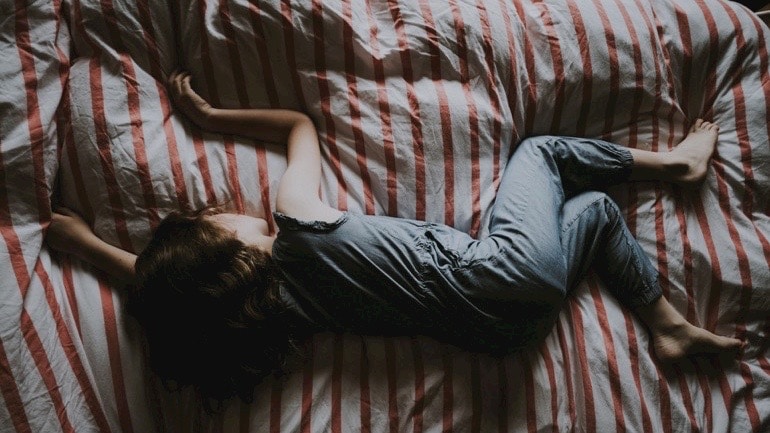
Children with ADHD often have trouble falling asleep, and when they do sleep, they move around a lot—walking, talking, etc. The time it takes a child to fall asleep varies from two to three hours for a child with ADHD to only about 40 minutes for a child without the condition.
Sleep problems can be related to ADHD in one of four ways:
- A specifically related ADHD and sleep disorder
- Sleep problems associated with another disease that occurs with ADHD, such as anxiety
- Sleep problems as the result of stimulant use
- Sleep problems unrelated to ADHD
More than 25% of all children, especially those with ADHD, will develop a sleeping disorder at some point. They have a significant but diverse impact on family dynamics, school success, and other health issues. The most common sleep disorders are the following:
Restless Legs Syndrome
The symptoms caused by a specific sleep disorder and ADHD could be associated with restless legs syndrome. The symptoms include unpleasant sensations like the feeling of bugs crawling on the skin. All these sensations are relieved by physically moving the limbs. This phenomenon is worse in the evening or at night and involves an overwhelming desire to move.
Studies show that up to 44% of people with ADHD have this syndrome, indicating that the amount of movement at night is strongly related to the degree of hyperactivity during the day. ADHD and the sleep deprivation associated with this syndrome can negatively impact a child’s quality of life.
Snoring, Sleep Apnea, and Hyperactivity
Children with ADHD may have difficulty breathing at night, ranging from light snoring to complete sleep apnea. The underlying causes of ADHD could be the following:
- Dilated tonsils and adenoids
- Cranial-facial anomalies
- Problems with weight or obesity
- Neuromuscular disease
- Allergies
The relationship between respiratory disorders associated with a drop in oxygen levels in the blood and hyperactivity has not been established in children who have ADHD and sleep apnea. However, one study suggests that ADHD can be removed in 81% of children if their snoring is effectively treated. Typically, snoring occurs in up to a third of children with ADHD, compared to only 10% of controls.
Again, children with these sleep difficulties are seldom overly sleepy. Instead, they will experience dizziness, sweating, developmental delays, and learning or behavior difficulties.
Does Lack of Sleep Make ADHD Worse?
As we mentioned above, many parents of children with ADHD report that their child struggles at bedtime or has trouble sleeping. A new study by the American Academy of Child and Adolescent Psychiatry suggests that the problem may be related to the child’s “internal clock,” which determines the time the child falls asleep each night.
When reviewing the available medical literature, trends in the data suggest that some sleep disorders may be more common in children with ADHD. In the case of ADHD, toddler sleep will often be disrupted. However, most studies show no difference in total sleep time or the time it takes to fall asleep when comparing unmedicated ADHD children to non-ADHD children. At the same time, these observations were made:
- Increased anxiety and periodic limb movements during sleep in children with ADHD
- A potentially reduced percentage of time spent in REM sleep in children with ADHD
- An increased occurrence of parasomnia, nightmares, and other sleep disorders in children with ADHD
- Hyperactivity symptoms that worsen in children with ADHD and lack of sleep
Since sleep problems have been shown to contribute to or exacerbate the difficulties in children with ADHD, most specialists state that treating sleep disorders in children can lead to improvements in their behavior. Studies show that sleep affects the parts of the brain that control thinking, decision making, and impulsivity, which are all thought to be impaired in children with ADHD.
Sleep and ADHD are connected unquestionably, and untreated ADHD leads to significant impairment in interpersonal, occupational, and cognitive domains, including IQ scores and test scores that are lower than controls. Therefore, it’s essential for children experiencing inattention, impulsiveness, and hyperactivity to be evaluated for ADHD, as well as sleep disorders, when appropriate.
What Are the ADHD Sleep Medication Options?
Using prescription drugs such as Ritalin (methylphenidate) to treat ADHD may add another level of complexity to the problem. This kind of medication is often used to treat ADHD as well as narcolepsy and chronic fatigue syndrome. Parents of children treated with stimulants are more likely to report sleep problems in their children, mostly insomnia.
In conjunction with treating ADHD, insomnia medication may be needed at some point. After all, these negative sleep effects are especially noted when the doses are taken too close to bedtime. Keep in mind that how these drugs can affect other aspects of sleep are not well understood.
Some parents find supplements helpful in alleviating symptoms of ADHD in toddlers and the sleep problems related to it. It’s crucial to ask your doctor before using them as they may interact or interfere with other medications.
Melatonin
The pineal gland secretes this natural hormone in the brain. Melatonin helps regulate sleep and can improve the onset and the adequate duration of sleep in children with ADHD. It can also be useful for adults and children who are dealing with jet lag.
L-Theanine
This is an amino acid found in green and black tea that seems to work against the effects of caffeine. It was shown to help manage problems with sleep and ADHD in adults. L-theanine is used by some people to reduce stress and promote relaxation. However, you can still get the benefits of drinking tea earlier in the day (just avoid caffeine in the evening).
Whenever the therapy is taken, parents need to be patient. Sleep problems take some time to resolve. If you stick to a routine, your child will slowly but inevitably start feeling calmer and enjoy the benefits of a good night’s sleep.
How Can I Help My ADHD Child Sleep?

Some rituals and sleep hygiene principles can help your child fall asleep after getting into bed.
Useful Tips Before Going to Bed
Amongst them are taking a warm shower or bath, drinking a cup of herbal tea, spending some quiet time at bedtime, and simply helping the brain stop and prepare for sleep. Here are some simple options you can try in your quiet time before going to bed instead of viewing modern technology screens:
- Reading time for both adults and children
- In the case of insomnia and ADHD, listening to relaxing music or soothing “outside” sounds like running water (white noise as a light, steady, monotonous sound can be soothing and non-stimulating)
- Perform deep, relaxing breathing exercises
Some people have found that using aromatherapy (aromas such as lavender, jasmine, and chamomile) in baths has helped them sleep better at night. Nevertheless, make sure the sleep environment is comfortable, the pillows and mattresses are suitable, the lights are low, the temperatures are cool (not cold or too warm), and all electronic devices are switched off.
Some Important “Don’ts”
To avoid the exacerbation of sleep deprivation and ADHD symptoms, it’s recommended to consider the following:
- Don’t eat sugar – Avoid sugary foods and drinks at the end of the day because they can contribute to hyperreactivity and insomnia. The additional initial energy boost from sugars can make it difficult to fall asleep.
- Stop worrying – Once your head hits the pillow, the problems of the day can begin to race through your mind, making sleep impossible. This tip can also help in cases of ADHD and sleep walking or talking. One approach to stop this is to keep a pen and paper near your bed. Note your thoughts and anxieties and promise to address them in the morning.
Adopting All the Healthy Habits
Allow Only Positive Thoughts
Although it may take some time to adjust your thinking, try to think “happy thoughts” at bedtime. Set your worries and negative thoughts aside and get into the habit of thinking positively before bed, especially when trying to manage ADHD and insomnia. One method is to think of a favorite place, such as the beach. You can even play ocean sounds. Happy thoughts and good feelings can facilitate falling asleep.
Maintain a Regular Bedtime and Wake-up Time
Sleeping at a specific time each night and waking up at a regular hour each morning encourage better sleep. Your internal biological clock helps regulate when you sleep and wake up. Consistency enables you to keep the right watch and get the sleep you need.
Exercise
It not only promotes good health and overall well-being, but it also supports good sleep when a child has ADHD and sleep issues. Heavy training just before bedtime is not recommended, but exercising during the day will make it easier to fall asleep at night. Remember to include a lot of physical outdoor play for children with ADHD.
Know When to See Your Doctor
While some of the mentioned sleep strategies can be employed on their own, there are times when medical advice is needed. The following three concerns are topics you may want to discuss with your doctor:
- Iron levels – Some people with iron deficiency anemia may experience restless legs syndrome.
- Treatment times – Adjusting the dose of ADHD medication and sleep therapy or the time it’s taken may help make sleep a little easier.
- If sleep problems continue – Sleep disorders—such as sleep apnea and ADHD together, restless legs syndrome, narcolepsy, autism-related sleep conditions, or other medical issues—can cause or contribute to ADHD problems. If you or your child continue to have sleep problems, consult your doctor.
FAQs
Do ADHD kids sleep less?
Yes. Unfortunately, children and adults with ADHD have a higher prevalence of sleep issues and seldom achieve the right number of hours of sleep for their age. A research study demonstrated that children with ADHD have three times more difficulty falling asleep than other children and often stay awake during the night. This leads to the logical result that 57% of ADHD children’s parents sleep less than six hours a night.
Can ADHD make you tired?
When ADHD is associated with sleep disorders and the symptoms of lack of sleep, then fatigue becomes one of the main problems in children and adults with the condition. Moreover, the two are connected since restlessness leads to even worse attention difficulties.
Do adults with ADHD need more sleep?
ADHD adults usually need an average of eight hours of sleep each night to feel productive and well during the next day. Since patients with ADHD often have a hard time falling asleep or have other sleep problems, they might feel like they need more time to sleep. Sadly, when sleep deprivation develops, ADHD symptoms get worse, and that makes it harder for them to sleep the next night.
Conclusion
Children who have ADHD and sleep issues may have similar symptoms, such as inattention, overactivity, and anxiety. The interaction between these two conditions is significant and may be misdiagnosed as their symptoms can overlap. Less sleep or the lack of good, quality sleep are often problems for children and adults living with ADHD.
Sleep is essential for the ability to focus and concentrate. When it comes to overall mood, health, and well-being, many children and adults with ADHD still don’t get the sleep they need. Because of the ways ADHD and sleep issues interact, the symptoms and signs of ADHD can worsen throughout the day.


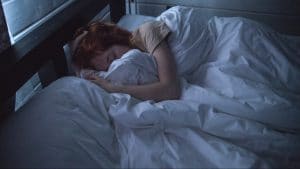


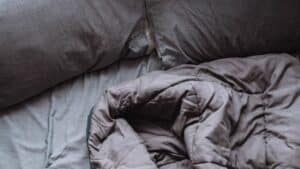

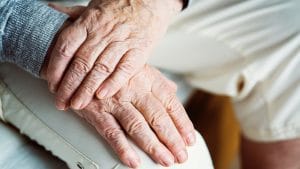
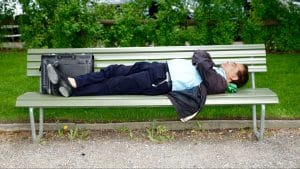
Warning: Undefined array key "format" in /home/602518.cloudwaysapps.com/cspedpjass/public_html/wp-content/themes/disturbmenot/template-parts/post-item/post-comment.php on line 23
Warning: Undefined variable $commenter in /home/602518.cloudwaysapps.com/cspedpjass/public_html/wp-content/themes/disturbmenot/template-parts/post-item/post-comment.php on line 27
Warning: Trying to access array offset on value of type null in /home/602518.cloudwaysapps.com/cspedpjass/public_html/wp-content/themes/disturbmenot/template-parts/post-item/post-comment.php on line 27
Warning: Undefined variable $commenter in /home/602518.cloudwaysapps.com/cspedpjass/public_html/wp-content/themes/disturbmenot/template-parts/post-item/post-comment.php on line 29
Warning: Trying to access array offset on value of type null in /home/602518.cloudwaysapps.com/cspedpjass/public_html/wp-content/themes/disturbmenot/template-parts/post-item/post-comment.php on line 29